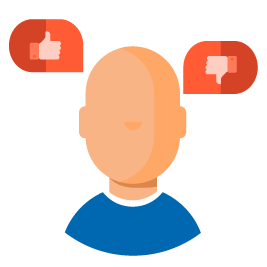Keap vs Salesforce
Trying to decide between Keap and Salesforce? Here's our comparison to help you make an informed decision between the all-in-one CRM platforms.
Get started with HubSpot Smart CRM today!
Overview
Trying to choose between Keap and Salesforce? Both are powerful marketing and sales platforms built on impressive CRMs, but the best choice for you depends on several factors.
That said, whatever your industry, business size and your goals, choosing a CRM that complements the rest of your tech stack is one of the best investments you can make in your business.
Customer relationship management is at the heart of every modern business, and it’s now the fastest-growing software market in the world, with a crowded space valued at $120 billion and with around 581 CRM software platforms on the market.
Choosing the right CRM platform makes customer management a breeze, and with systems like Keap and Salesforce, you can streamline your workflows even further with powerful automation and data-driven insights.
In this comparison of Salesforce and Keap, let's dig into the differences and outline how to know which all-in-one platform is the better pick for your business.
About Salesforce
With an estimated market share of 23.74%, Salesforce is one of the world’s most popular CRMs. It's primarily geared toward enterprise-level corporations and shines when you need complexity and high levels of personalization.
Salesforce offers a vast integrated suite of tools, which includes automated solutions for attracting and monitoring marketing leads, tracking and managing sales pipelines, and garnering insights into campaign performance.
If you're not sure which Salesforce product is best for your business, a few key products to consider are:
- Marketing Cloud: a marketing CRM with built-in automation and personalization.
- Sales Cloud: their #1 CRM for sales teams.
- Pardot: advanced B2B automation and works well alongside Sales Cloud.
About Keap
Keap has a considerable market share of an estimated 13.19%, and is designed for smaller businesses that want to keep their tech stack simple and powerful.
Like Salesforce, Keap is entirely cloud-based, and it provides an all-in-one sales and marketing solution with the overarching goal of converting leads into paying customers.
Keap is still widely known by its former brand name Infusionsoft, which it used up until January 2019.
- Keap Gro: A CRM with built-in quotes, invoices and payments plus email marketing. It's ideal for smaller businesses to get organized and better manage their leads and clients.
- Keap Pro: Aimed at growing businesses, this product offers everything in Keep Gro plus powerful automation, a landing page builder, plus smart forms and reports.
- Infusionsoft: Keap's top-tier product for small businesses with more advanced sales and marketing automation needs.
How HubSpot Measures Up
Keap and Salesforce are powerful marketing and sales platforms built on CRMs. HubSpot's Smart CRM has all the tools you need for marketing, sales, content management, operations, and customer service. Each product in the platform is powerful alone, but the real magic happens when you use them together.
Feature comparison of Keap vs Salesforce
Both Salesforce and Keap are cloud-based solutions, although there are mobile apps available as an alternative to accessing your customer data through a browser.
When it comes to deployment, Keap provides a quick-start training session, with an optional three-day on-site training program and live demos available. The compulsory onboarding program starts at $99.
Being tailored more to the needs of big businesses with multiple branches, Salesforce usually takes longer to deploy, and there’s a steep learning curve for getting accustomed to some of its more advanced features.
Salesforce's Jump Start program, which costs an extra $5,000, provides eight six-hour meetings to keep deployment times within two weeks.
Keap isn’t as feature-rich as Salesforce, given its very different target market, but that can be a good thing when it comes to avoiding feature bloat and unnecessarily complex onboarding processes.
Keap's dashboard provides a valuable overview of the features that are most important to your business, alongside core insights to measure performance.
Its core features include a drag-and-drop campaign builder, landing page builder, website tracking tools, email marketing and reporting, marketing automation, invoices and quoting. These are all powerful tools and can be more than enough for smaller businesses.
Salesforce provides a similar feature set in terms of core CRM functionalities, but with a lot more scope for complexity and deep customization.
Sales Cloud offers advanced lead management, enabling sales teams to convert leads into opportunities by tracking them across a wide range of channels including social media, email and web. You can also generate and send quotes to B2B clients.
If you're chiefly looking for a marketing tool, Marketing Cloud delivers impeccably personalized customer journeys across email, mobile, social, digital advertising and DMP. There's a lot of scope for built-in automation, segmentation and 1-1 journey building.
With other products in the Salesforce family, including Pardot – their advanced B2B automation software – the sky's the limit for digitizing and customizing your workflows.
Keap provides an interactive customer pipeline feature to give you a complete overview of the effectiveness of your marketing and sales campaigns. With Keap, it's also easy to create simple reports that are laser-focused on the KPIs that matter most to you.
Create records that only show the information your sales team needs to reach out, follow up, and close.
You can keep track of your leads and clients by monitoring activities with customizable dashboards that display key metrics such as revenue per customer, demographical attributes and previous interactions with your business.
Salesforce offers advanced reporting and analytics that can forecast sales, identify campaign performance issues and much more. With the mobile app, sales reps can also make key decisions on the move.
Another powerful feature of Salesforce is Einstein, an artificial intelligence solution that helps you proactively identify opportunities and automate routine workflows. This is available as an add-on product.
Keap provides out-of-the-box integrations with a wide range of industry-leading business apps like Microsoft Office, Gmail, WooCommerce and Shopify.
Most integrations are tailored towards the needs of small businesses, though there are dozens more connectors and other add-ons to help you build a fully connected operational environment.
Salesforce provides an open API allowing DevOps teams to create their own integrations.
On top of that, there are native integrations available for Salesforce with industry-leading accounting, ecommerce and cloud storage services. It’s possible to connect any system, including on-premises ones, to your Salesforce environment. However, this requires professional developer expertise.
Every Salesforce subscription comes with the Standard support plan, which includes guided user experiences and online training paths via the Trailhead program. However, this level of support is also limited by two-day response times. For those requiring more extensive support, the Premier and Premier Plus programs cost an additional 20 and 30% respectively.
Keap provides an all-in-one CRM and marketing automation solution tailored to the needs of small businesses, whereas the comparative offering from Salesforce focuses on mid-market and enterprise-level customers.
Keap pricing
Keap prices start at $79 for one user per month for up to 500 contacts for the Keap Grow package, increasing to $149 and $199 for Keap Pro and Infusionsoft.
Salesforce pricing
Salesforce pricing depends on the product you choose, but the short answer is that it's likely to be much more costly than Keap.
Sales Cloud has four product tiers, with prices starting at $25 per user per month, increasing to $300 for the Unlimited package.
Within Marketing Cloud, you can opt for an Email, Mobile and Web Marketing plan to personalize and automate customer journeys starting at $400/month.
Salesforce also offers high-end B2B marketing automation software Pardot with prices starting at $1,250 for 10,000 contacts.
Salesforce is far more scalable than Keap if you plan on growing a huge company, but it’s also overkill for smaller organizations and many B2C businesses.
1. You have a small business
If you have a small business, or you primarily serve B2C markets, the lower costs and easier implementation process makes Keap a stronger choice over Salesforce.
Don't get us wrong: Keap isn't a low-budget choice and it doesn't scrimp on quality in the slightest. It's one of the most reliable CRMs on the market. But compared to Salesforce, it is cheaper and much more accessible for small businesses.
One potential shortcoming of Keap if you're budget-sensitive is that all new users are required to enroll in an onboarding program, with prices starting at $99. However, this also helps ensure users get maximum value from the platform in less time.
2. You want more simplicity
While Salesforce is built for mid-market and enterprise-level corporations, Keap offers a more affordable and straightforward feature set with a laser-focus on small business needs.
If you don't need all of the bells and whistles, Keap is likely to be a better match for your business than Salesforce.
3. You're on a tighter budget
Infusionsoft, Keap's top-tier all-in-one product for CRM and automation, is still a tiny fraction of the cost of Salesforce.
While Infusionsoft by Keap starts at $199/month, you can easily be paying several thousand dollars a month for Salesforce. Salesforce Pardot Growth – aimed at B2B companies – starts at $1,250/mo.
1. You have a mid-size to enterprise-size company
Salesforce is primarily targeted towards the mid-market and enterprise B2B sectors, making it an obvious contender to consider if your organization fits into these categories.
2. You want the most scope for customization
If you have the resources, Salesforce provides an unparalleled level of customization.
Though costly, you have the flexibility to add many other Salesforce products to your core CRM, such as the Email, Mobile and Web Marketing Studio package (from $400/month), social media marketing, digital advertising, or advanced B2B marketing automation.
3. You can handle the complexity
Salesforce requires extensive and lengthy onboarding and training programs to get the most out of it. For support and ongoing maintenance, it also helps to have a dedicated IT department. If not, you can outsource deployment and maintenance to a specialized Salesforce consultancy firm.
If you're familiar with the Salesforce product family or have the budget and resources for in-house or outsourced support, it can be a fantastic choice for larger companies looking for enterprise-level solutions.
When to Choose Keap vs. Salesforce
When to Choose Keap
-
You have a small business
-
For a simple all-in-one sales and marketing solution on a powerful CRM
-
Lower costs and faster, easier implementation process
-
Quick-start training session
When to Choose Salesforce
- You have a mid-size to enterprise-level company
- For highly advanced and customized software built on the world’s most well-known CRM
- For unparalleled customization
- You have the resources and budget to handle implementation and maintenance
A Community That Has Your Back

HubSpot Solution Partners
HubSpot’s Solution Partner Program is a network of over a thousand agencies to help you resource your marketing strategy with HubSpot. Whether you need someone to help create content, set up ads, or build workflows, there’s a partner here for you.

HubSpot Community
Our Community is there when you need them. Whether it’s getting set up or figuring out the best way to customize Marketing Hub for your needs, there are over 85,000 community members ready to answer your questions.
.png?width=567&height=567&name=2023_ServiceHub_Knowledge_base1%20(2).png)
Knowledge Base
You’re busy. You don’t have time to file a support ticket. You’re also extremely smart and can find answers on your own. Search our comprehensive Knowledge Base to answer any question you might have about our products.
Start Using HubSpot Smart CRM Today
Think CRM software is just about contact management? Think again. HubSpot's customer platform has free tools for everyone on your team, and it’s 100% free — forever.
